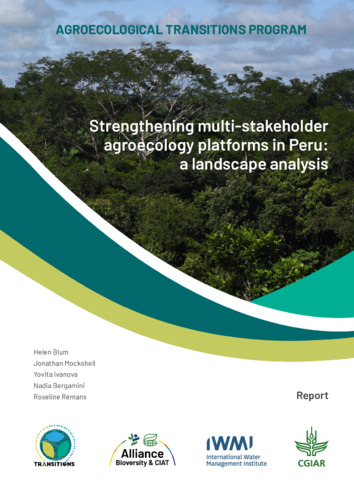Strengthening multi-stakeholder agroecology platforms in Peru: A landscape analysis.
Using multi-stakeholder platforms offers a promising approach for sharing agricultural innovation, reducing transaction costs, and catalyzing development through stimulating stakeholder engagement in the innovation process to accelerate food systems transformation. Agriculture-related multi-stakeholder platforms (AMSPs) are major players to intervention strategies of agricultural development programs. However, often AMSPs have faced multiple challenges that limit and negatively impact their functions. This study aims at mapping the AMSP landscape, examining operational activities, and providing recommendations for strengthening greater private and public sectors engagement to support long-term sustainability in Peru. The study used a three-step qualitative research approach to identify AMSPs, then collecting secondary and primary data. Results reveal three types of AMSPs classified from 28 identified platforms: development organization-led, civil society organization (CSO)-led, and government-led platforms. Their main characteristics were then investigated according to the four basic dimensions of organization theory: structural, contextual, operational, and relational aspects. Next, the study analyzed the influence of each AMSP type on agricultural policies and practices, including those integrating agroecological approaches. The study then examined each AMSP’s achievements and challenges related to AMSP impact and sustainability, together with constraints to private and public sector engagements, incentives and investment in agroecological transitions. From this landscape analysis, various mechanisms and possibilities have been identified for the Agroecological TRANSITIONS and other related sustainable approaches projects to engage with the existing AMSPs. This will provide a process to co-design and co-create innovative incentive mechanisms to leverage investments, support the use of holistic traceability tools and scale out agroecological practices in cocoa value chains in Peru.

